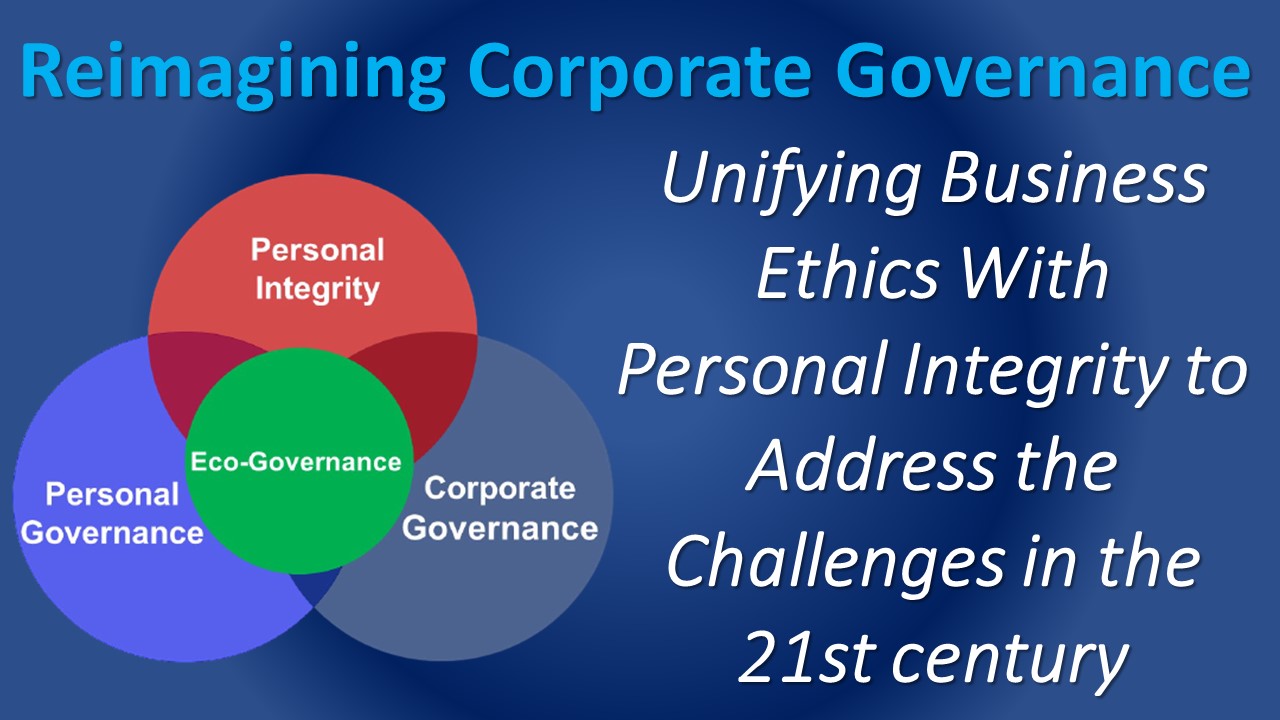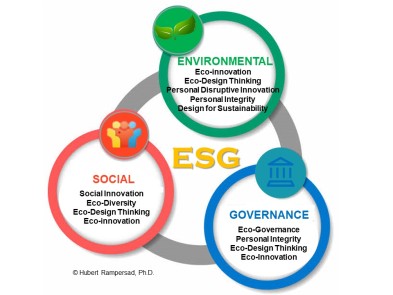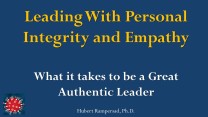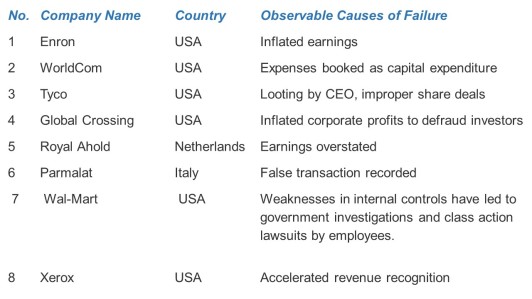How Sustainability Fuels Durable Corporate Governance
“It’s about time we understand that corporate governance cannot be controlled effectively with formal rules, regulations, guidelines, and procedures only. It’s about decency, empathy, and personal integrity, which must be a way of life, with no need for rules, and cultivated from within. We should be aware that the foundation of sustainable corporate governance is personal integrity, and that sustainability begins with personal integrity”— Hubert Rampersad
“Today’s complex world needs sustainable corporate governance. Traditional corporate governance approaches taught at university and implemented in many organizations are not sustainable.”— Hubert Rampersad
“The higher your personal integrity, the better your attentiveness, the better your empathic skills, the better person you are”- Hubert Rampersad
“Good people do not need laws to tell them to act responsibly, while bad people will find a way around the laws” – Plato
“Sustainability is a holistic and ethical system in which humans and nature can exist in harmony for a very long period of time. It starts with you.”– Hubert Rampersad
“Empathy is just what is needed to make the world a better place for all animals and humans. Personal integrity is the foundation of empathy, in which there is no room for ego”. — Hubert Rampersad
“There is such a need for a complete rebirth of trust in our leaders. Somewhere along the line, they lost their authenticity, humility, and integrity, and in doing so they have lost their empathy and inner alignment“– Hubert Rampersad
ESG and SDGs are two complementary frameworks. The Environmental, Social, and Governance (ESG) framework originated in the 70s, while the Sustainable Development Goals (SDGs) framework was established by the United Nations General Assembly in 2015, and focused on 17 critical areas to address economic, social, and environmental challenges by 2030. By the way: “The most important SDG #18 is missing in SDGs, which is GOOD PEOPLE. We need to address the real roots of climate change, not just the symptoms. People’s personal integrity needs to be tackled, which is awareness about their behavior and actions toward human beings, animals, and plants. This is the foundation of empathy. Climate change actions need good people. The world is full of bad people, which is probably the reason why so few engage in climate change”. — Hubert Rampersad
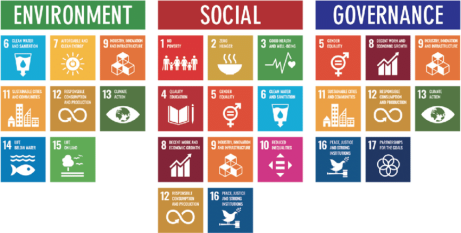
Both frameworks operate under the same principle; Pursuing sustainability. SDG and ESG lead to Purpose, which is making a positive impact on the world. Purpose is currently a hype and buzzword, and not sustainable. It’s a concept I discussed holistically in my new book “Eco-Design Thinking for Personal, Corporate, and Social Innovation“. Organizational purpose tells you what the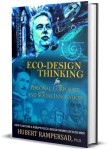 organization stands for and to what extent it makes a sustainable positive contribution to the organization, employees, society, and the environment. Organizational purpose starts with the personal purpose of its employees. In my personal disruptive innovation model, I described in detail how to find your purpose in life and how to live a meaningful, better, happier, and healthier life, in business and private life. In this book, I also introduced a methodology for aligning
organization stands for and to what extent it makes a sustainable positive contribution to the organization, employees, society, and the environment. Organizational purpose starts with the personal purpose of its employees. In my personal disruptive innovation model, I described in detail how to find your purpose in life and how to live a meaningful, better, happier, and healthier life, in business and private life. In this book, I also introduced a methodology for aligning organizational purpose with personal purpose for the sake of sustainable employee engagement; by connecting their values and identity with that of the organization, read “Reimagining HR“. This Figure shows how SDG, ESG, and Purpose are interrelated.
organizational purpose with personal purpose for the sake of sustainable employee engagement; by connecting their values and identity with that of the organization, read “Reimagining HR“. This Figure shows how SDG, ESG, and Purpose are interrelated.
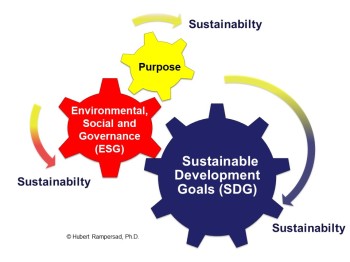
In this article, I focus on reimagining corporate governance by putting my Eco-Governance and Eco-Design Thinking method in the ESG framework; by unifying my eco-innovation, eco-design thinking, “Authentic Governance“ (Eco-Governance), and eco-diversity models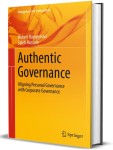 with personal integrity and empathy, to address ethical challenges in the 21st century.
with personal integrity and empathy, to address ethical challenges in the 21st century.
This ESG model shows how my holistic concepts of eco-governance, eco-design thinking, eco-innovation, personal disruptive innovation, personal integrity, and eco-diversity are embedded in the ESG framework.
Read further:
Reimagining Corporate Governance
Owing to the lessons learned throughout the COVID-19 crisis, it is high time to design a better world that is characterized by empathy, personal integrity, non-racialism, nature-friendly, smart working, circularity, a changed role of HR, good governance, and ethical leadership. The significant feature of this better world entails SUSTAINABILITY, that is, sustainability in sustainability, innovation, design, HR, leadership, diversity & inclusion, corporate governance, family businesses, oil & gas, and management & design innovation education, as shown in this Figure.
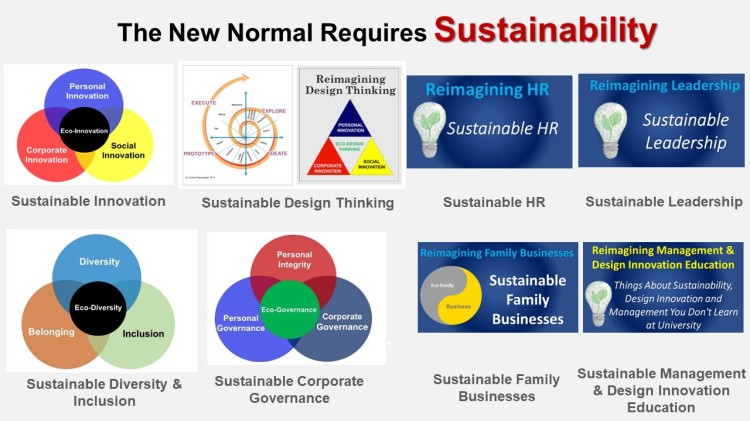
“Sustainability is a holistic and ethical system in which humans and nature can exist in harmony for a very long period of time”– Hubert Rampersad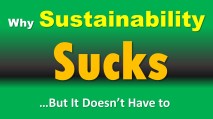
Read ” Why Sustainability Sucks”.
In my article “HOW TO DESIGN A BETTER WORLD“, I discussed in detail how to design a better world sustainably.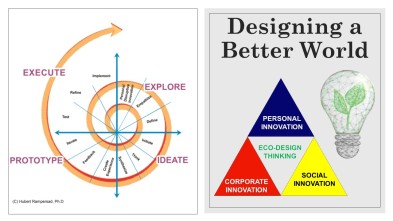
The first rule of sustainability is alignment with yourself, to continuously perceive what you do sustainability and be aware of the influence of your behavior and actions on human beings, animals, plants, and the environment. This is personal integrity, which is the foundation of empathy and eco-design thinking. I refer to my article “Design For Sustainability“.
Holistic Approach
The future of corporate governance entails eco-governance, which is a holistic approach that makes the link to personal integrity, personal governance, and corporate governance, as indicated in this Figure.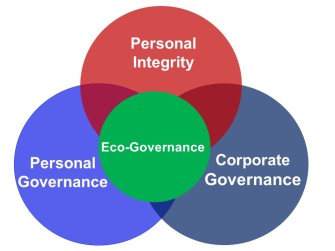
In my related book “Authentic Governance; Aligning Personal Governance with Corporate Governance“, I have defined these three elements, as follows:
- Personal Integrity; Entails awareness about your behavior and actions toward human beings, animals, plants, and the environment, by aligning your personal ambition with your behavior and your way of acting.
- Personal Governance; Entails the systematic process of continuous, gradual, and routine personal improvement, steering, and learning, based on your personal innovation strategy.
- Corporate Governance; Entails the systematic process of continuous, gradual, and routine corporate improvement, steering, and learning, via formal corporate regulations, procedures, and guidelines.
Some rare examples of traditional corporate governance not working
Here are some recent rare examples of traditional corporate governance not working the way it should:
- Massive corruption at Wells Fargo led to the resignation of its chief executive, John G. Stumpf. Wells Fargo implemented one of the best corporate programs in America, advised by Harvard Law School professors.
- Corruption at Apollo Global Settles Securities Case as S.E.C. Issues $53 Million Fine. Apollo misled its investors about two different issues and separately failed to supervise a senior executive suspected of misconduct. Apollo implemented a great corporate program by one of the BIG Four Accounting firms.
- Corruption at Tesco shocked the markets with an announcement acknowledging their profits for the previous six months were at least £250 million pounds lower than they announced a month ago. Tesco implemented a complete corporate program by one of the BIG Four Accounting firms.
Traditional Corporate Governance Programs Cause More Corruption and are not Suitable for the New Normal
Having great corporate governance programs in place but not complying with these programs has become a normal practice globally. Traditional approaches to corporate governance are extremely formal, bureaucratic, cosmetic, non-holistic, and non-authentic, and therefore provide no protection from potentially catastrophic ethical failures. Most corporate governance programs make things worse, create a stable basis for more corruption, and are doomed to fail. We need a sustainable and innovative solution to this global epidemic urgently. I picked up where others left off by launching an innovative and sustainable methodology for creating a culture of good people, in which high ethical values are aligned with their corporate governance rules, regulations, and guidelines and embedded in their minds. It is based on my new book “Authentic Governance; Aligning Personal Governance with Corporate Governance”. Two main endorsements for this book:
1) “Authentic governance or Eco-governance is a systematic, integrated, pragmatic, and innovative approach to corporate governance. By expanding traditional corporate governance concepts and integrating personal integrity and ethical leadership into one overall authentic governance framework, Dr. Hubert Rampersad gives us a new blueprint for sustainable corporate governance in which formal corporate regulations and personal values mutually reinforce each other. By unifying corporate ethics with individual ethics, he has written an outstanding synthesis, which is addressed to the corporate challenges of managing in the 21st century”.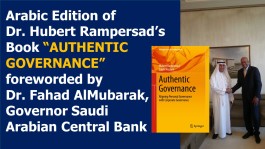
2) “This book makes a most useful contribution to the never-ending challenge of protection from potentially catastrophic ethical failures. It serves as a practical guide and a tool kit for executives who aspire to realize ethical corporate excellence”.
Eco-governance starts with value-based leadership development, embedding personal values in the mind of the Chairmen, Presidents, CEOs, CFOs, managers, and all employees, and guiding them to sincerely reflect on these values. This is about decency  and personal integrity. Eco-governance is one of the first tangible and measurable means to create a way of life within organizations, characterized by trust, credibility, transparency, personal responsibility, personal integrity, and high-performance ethical business culture. This will have a positive impact on society. I refer to my related YouTube video.
and personal integrity. Eco-governance is one of the first tangible and measurable means to create a way of life within organizations, characterized by trust, credibility, transparency, personal responsibility, personal integrity, and high-performance ethical business culture. This will have a positive impact on society. I refer to my related YouTube video.
The New Normal Requires Personal Integrity and Empathy
Let me illustrate this with some quotes:
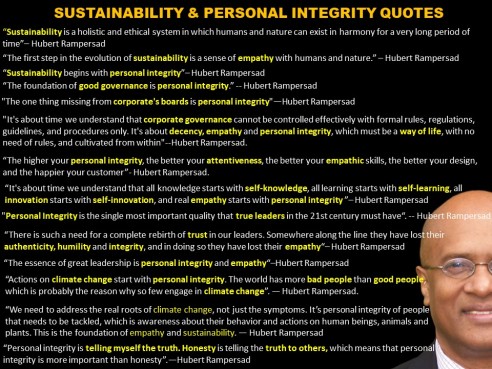
Read also my articles “Reimagining Leadership” and “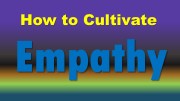 How to Cultivate Empathy”.
How to Cultivate Empathy”.
“In looking for people to hire, you look for three qualities: integrity, intelligence, and energy. If you do not have the first, the other two will kill you. If you hire somebody without personal integrity, you really want them to be dumb and lazy.”–Warren Buffett
Honesty and personal integrity are critical components in today’s business. They are the most fundamental character traits of leaders and professionals and crucial ingredients in creating empathy. Personal integrity is strongly related to empathy. Empathy means awareness of the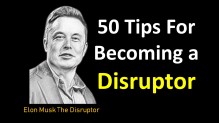 emotions of others; and the emotional connection with others. I refer to my article “50 Tips for Leading With Personal Integrity and Empathy“.
emotions of others; and the emotional connection with others. I refer to my article “50 Tips for Leading With Personal Integrity and Empathy“.
Failures
Many governments and large companies everywhere are currently very keen to revamp, develop, and implement a corporate governance code to address the above-mentioned shortcomings. Unfortunately, all these codes are cosmetic and do not provide adequate protection. The table below shows a summary of some other resonant cases of failure of corporate governance (Alexandru, 2012).
Behind all these scandals are a number of common factors, including:
- Poor ethical leadership and lack of personal integrity
- Mismanagement and management incompetence
- Fraud, corruption, and violation of corporate governance code of ethics
- Non-observance of the procedures stipulated in internal regulations
- Insufficient attention paid to risk management
- Inconsistent distribution of duties and responsibilities
- Inefficiency of internal audit
- Ignorance showed to the signals provided by external audit
- Influencing the external auditors to express an audit opinion inconsistent with reality.
All the above-mentioned organizations have comprehensive corporate governance codes in place, implemented by some left-brain accountancy firms and large law firms and advised by top Harvard Law School professors, which apparently are not working at all. They made things worse and created a stable basis for more corruption.
Unethical behavior of top executives, poor ethical leadership, lack of personal integrity, mismanagement, fraud, corruption, and violating corporate governance codes are the main contributors to these scandals. The human element represented by the directors and employees is the major cause of the mentioned failures. Especially unethical behavior of leaders is the main cause of bankruptcy and financial failures. Remember what Alan Greenspan, Former Chairman of the Board of Governors of the US Federal Reserve System, said: “Our market system depends critically on trust—trust in the world of our colleagues and trust in the world of those with whom we do business…. I am saying that the state of corporate governance to a very large extent reflects the character of the CEO.”
Due to the above-mentioned shortcomings, most companies’ approaches to corporate governance are extremely formal, bureaucratic, cosmetic, woolly, non-holistic, and no-authentic, and therefore fail to address the above-mentioned shortcomings. Their implementations of corporate governance provide no protection from potentially catastrophic ethical failures. We need a sustainable and innovative solution to this global epidemic, which I will present in the next section of this article.
Eco-Governance
“It’s about time we understand that corporate governance cannot be controlled effectively with formal rules, regulations, guidelines, and procedures only. It’s about decency, empathy, and personal integrity, which must be a way of life, with no need of rules, and cultivated from within”–Hubert Rampersad. Remember what Plato said in 340 BC: “Good people do not need laws to tell them to act responsibly, while bad people will find a way around the laws”. Most corporate governance programs make things worse, create a stable basis for more corruption, and are doomed to fail. Why don’t we learn from Plato and focus on creating a culture of good people, in which personal values are aligned with the laws and embedded in the mind of the people, instead of focusing on laws (corporate governance) only? I picked up where others left off by launching an innovative methodology for creating a culture of good Chairmen, Presidents, CEOs, CFOs, managers, and employees, in which high ethical values are aligned with their corporate governance rules, regulations, and guidelines and embedded in their minds.As demonstrated by Enron and others, traditional corporate governance codes (corporate laws) provide no protection from potentially catastrophic ethical failures. Company integrity must always start with personal integrity. It must be an informal learning process and a way of life, based on alignment with yourself and alignment with your company. This ethical process must be promoted and communicated within the whole company to all stakeholders consistently. In this way, ethical behavior will become routine in the whole organization, and leaders and employees will gain more understanding of their responsibility with regard to ethical behavior. They will understand that it is their responsibility to act ethically, on duty as well as off duty. This is a more sustainable, comprehensive, and holistic approach to ethics and social responsibility.
Against this background, I propose an organic and holistic approach to corporate governance called eco-governance, by integrating personal values and integrity into one overall authentic governance framework, in which formal corporate regulations and personal values mutually reinforce each other. This theory has been borne out through my leadership experiences in the corporate world globally in the past 30 years.
Eco-Governance Model
I have defined eco-governance in holistic humanized terms, namely: the systematic process of continuous, gradual, and routine improvement, steering, and learning, that leads to sustainable high performance and ethical excellence. I made a distinction between personal governance and corporate governance, which I will explain here in detail. So, eco-governance is a continuous voyage of discovery, involving continuous, gradual, and routine improvement, steering, and learning. It is about a journey towards a happier and more successful life for individuals and ethical corporate excellence.
By redefining and governing themselves effectively, leaders and employees will gain more understanding about their responsibility regarding ethical behavior, and they will understand that it is their responsibility to act ethically, on duty as well as off duty. The figure below shows the eco-governance model, which provides an excellent framework and roadmap to develop, implement, and cultivate personal governance and corporate governance in a systematic and sustainable way. This new governance blueprint is an inside-out approach and focuses mainly on the human side of good governance. It places more emphasis on understanding yourself and the needs of others, meeting those needs while staying true to your personal and corporate values, improving yourself and your personal integrity continuously, making ethics a way of life and a continuous learning process, and aligning these with formal corporate regulations, procedures, and guidelines, instead of focusing on exhaustive formal corporate regulations, procedures and guidelines only.
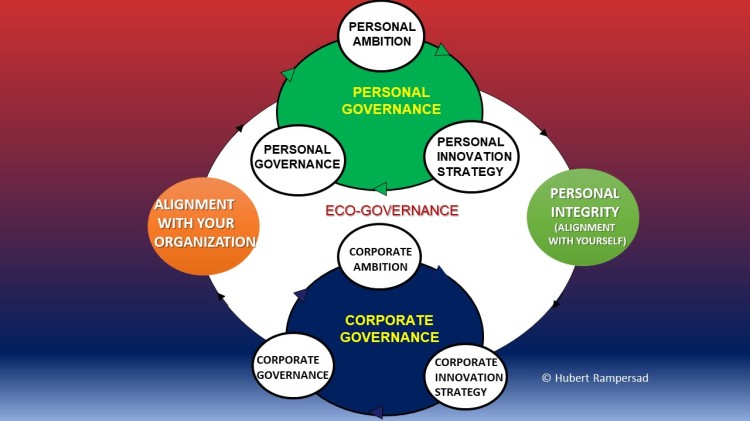
This eco-governance model consists of the following four phases, which are the building blocks of sustainable corporate governance:
1. Personal Governance:
a) Personal ambition; this phase involves a soul-searching process based on thought, introspection, and self-reflection, supported by a breathing and silence exercise. I refer to my article “Personal Disruptive Innovation”. Questions that you can ask yourself are: 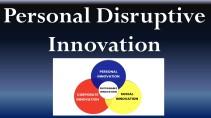 Who am I, What do I stand for? What makes me more ethical? What do I live for? Why do I want to lead? and What’s the purpose of my leadership? If the honest answers to the last four questions are power, prestige, and money, you may be at risk for your company. The result of this phase is the formulation of your personal mission, vision, and values. On the basis of insights acquired through this process, you develop self-awareness and self-regulation, which are the foundation of trustworthiness, integrity, and openness to learn.
Who am I, What do I stand for? What makes me more ethical? What do I live for? Why do I want to lead? and What’s the purpose of my leadership? If the honest answers to the last four questions are power, prestige, and money, you may be at risk for your company. The result of this phase is the formulation of your personal mission, vision, and values. On the basis of insights acquired through this process, you develop self-awareness and self-regulation, which are the foundation of trustworthiness, integrity, and openness to learn.
b) Personal Innovation Strategy; personal ambition has no value unless you take action to make it a reality. Therefore the emphasis in this stage is developing an integrated and well-balanced action plan based on your 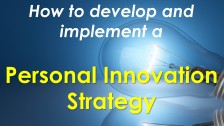 personal ambition, which I call a Personal Innovation Strategy (PIS). It’s about translating your personal ambition into action, which I have described in detail in my article “Redesigning Your Life”.
personal ambition, which I call a Personal Innovation Strategy (PIS). It’s about translating your personal ambition into action, which I have described in detail in my article “Redesigning Your Life”.
c) Personal governance; the next step is to implement, maintain, and cultivate your ambition and PIS to govern yourself effectively and to become a better human being. This entails personal governance; the systematic process of continuous, gradual, and routine personal improvement, steering, and learning. Your PIS needs constant updating to reflect the new challenges you take, the lessons you have learned, and the growth of yourself.
2. Personal Integrity (Alignment with yourself); corporate governance will be cosmetic if personal integrity is not a way of life in your organization and if you focus mainly on ethical procedures, formal regulations, and guidelines. Therefore it’s needed to align your personal ambition  with your behavior and your way of acting. I refer to my article “The Future of Leadership“. So you need to commit yourself to live and act according to your personal ambition and to keep promises that you make to yourself. Personal governance built on the person’s true character is sustainable and strong. You should reflect your true self and must adhere to a moral and behavioral code set down by your personal ambition. This means that who you really are, what you care about, and your passions should come out in your personal ambition, and you should act and behave accordingly (you should be yourself) to build trust. This inner alignment is an important step towards lasting personal growth and reinforcing integrity, honesty, trustworthiness, credibility, transparency, and personal charisma. People with this perspective on life value others’ lives and create a stable basis for others to feel they are credible, truthful, and trustworthy.
with your behavior and your way of acting. I refer to my article “The Future of Leadership“. So you need to commit yourself to live and act according to your personal ambition and to keep promises that you make to yourself. Personal governance built on the person’s true character is sustainable and strong. You should reflect your true self and must adhere to a moral and behavioral code set down by your personal ambition. This means that who you really are, what you care about, and your passions should come out in your personal ambition, and you should act and behave accordingly (you should be yourself) to build trust. This inner alignment is an important step towards lasting personal growth and reinforcing integrity, honesty, trustworthiness, credibility, transparency, and personal charisma. People with this perspective on life value others’ lives and create a stable basis for others to feel they are credible, truthful, and trustworthy.
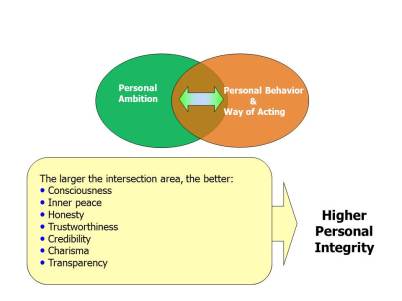 These first two stages in the authentic governance model focus on personal leadership development by cultivating your inner compass.
These first two stages in the authentic governance model focus on personal leadership development by cultivating your inner compass.
3. Corporate Governance:
a) Corporate ambition; this phase involves formulation of the shared corporate ambition. Corporate ambition is the soul, core intention, and guiding principles of the organization and encompasses the corporate mission, vision, and core values.
b) Corporate Innovation Strategy; corporate ambition has no value unless you don’t take action to make it a reality. Therefore the emphasis in this stage is developing an integrated and well-balanced action plan based on the corporate ambition to realize the corporate objectives. This Corporate Innovation Strategy (CIS) is needed to improve the business and governance processes continuously based on the corporate ambition.
c) Corporate governance; the next step is to implement, maintain, and cultivate the corporate ambition and CIS in order to govern your organization effectively, to become an ethical company. This entails corporate governance: the systematic process of continuous, gradual, and routine corporate improvement, steering, and learning. This stage focuses also on the implementation of formal corporate regulations, procedures, and guidelines (corporate governance code).
4. Alignment with your organization; the emphasis here is aligning personal ambition with corporate ambition and creating uniformity of personal and organizational values. I refer to my article “The Future of HR“. By unifying corporate ethics with individual ethics you will create a strong foundation of peace, integrity, engagement, and learning upon which creativity and growth can flourish, and life within the organization will become a more harmonious and ethical experience. It’s about aligning personal governance with corporate governance and getting the optimal fit and balance between these two activities in order to enhance labor productivity, create a climate of trust, and stimulate engagement, commitment, integrity, and passion in the organization. This alignment process is needed 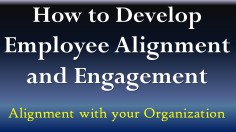 because staff members don’t work with devotion or expend energy on something they do not believe in or agree with. If there is an effective match between their interests and those of the company, and if their values and the company’s values align, they will be engaged and will work with greater commitment and dedication toward realizing the company’s objectives. When the personnel’s personal ambition is in harmony with their company’s (are compatible) and combined in the best interest of both parties, the results will be higher productivity and sustainable corporate governance. Employees are stimulated in this way to commit, act ethically, and focus on those activities that create value for clients. This will create a strong foundation of peace, personal integrity, and stability upon which creativity and growth can flourish, and life within the organization will become a more harmonious experience.
because staff members don’t work with devotion or expend energy on something they do not believe in or agree with. If there is an effective match between their interests and those of the company, and if their values and the company’s values align, they will be engaged and will work with greater commitment and dedication toward realizing the company’s objectives. When the personnel’s personal ambition is in harmony with their company’s (are compatible) and combined in the best interest of both parties, the results will be higher productivity and sustainable corporate governance. Employees are stimulated in this way to commit, act ethically, and focus on those activities that create value for clients. This will create a strong foundation of peace, personal integrity, and stability upon which creativity and growth can flourish, and life within the organization will become a more harmonious experience.
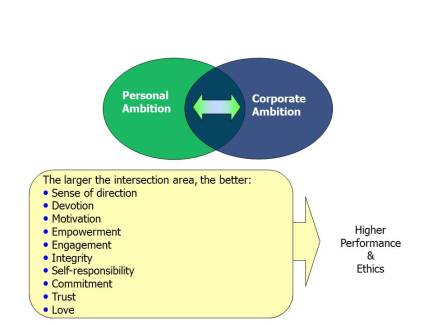
The effective combination of all these four phases creates a stable basis for a high-performance ethical organization. To illustrate the importance of this authentic governance model: Of the 140 businesses recognized by the Ethisphere Institute as the 2013 World’s Most Ethical Companies, Aflac and Starbucks have received this honor every year between 2007 and 2013. They have been judged to not only have exemplary ethical standards and policies but also consistently high ethical practices. Their corporate governance codes are not empty words, but represent active coordinates in maintaining an ethical business culture, based on effective values‑based leadership and the alignment of personal governance with corporate governance.
Read also: “Sustainable Good Governance, the Best Strategy for the Oil & Gas Industry”.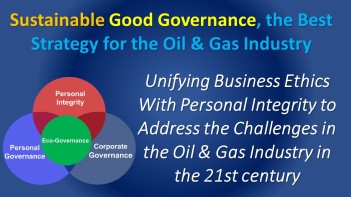
This eco-governance concept is also based on my new book “Eco-Design Thinking for Personal, Corporate and Social Innovation; How to Become a Disruptive Eco-Design Thinker Like Elon Musk“. Read the excerpt of this book, which is about reimagining design and innovation.
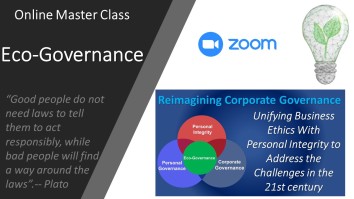
Hubert Rampersad, Ph.D., founded the Center of Excellence in Human-Centered and Purpose-Driven AI Innovation in Orlando. He is a Dutch-American visionary leader in innovative solutions for genuine sustainability, disruptive design innovation, critical thinking in the age of AI, human-centered and purpose-driven AI, and entrepreneurial leadership. He holds a Ph.D. in Innovation Sciences, an MSc in Technology Engineering & Robotics, and a BSc in Mechanical Engineering from leading accredited universities in the Netherlands (Delft University of Technology, Eindhoven University of Technology). He is a well-known futurist, advocating for genuine sustainability on a global scale. With extensive knowledge and expertise, he has authored 25 books on the topics above in many languages and is highly regarded for his insights in these fields. One of his books, “Total Performance Scorecard,” has been published in 20 languages. Dorothy Leonard, an innovation professor at Harvard Business School, wrote the book’s foreword. Rampersad has also previously served as a guest lecturer at MIT Sloan and was featured in BusinessWeek. He was a senior design innovation coach at ASML, the most important tech company in the world and “Europe’s most valuable tech firm“.
Center of Excellence in Eco-Governance
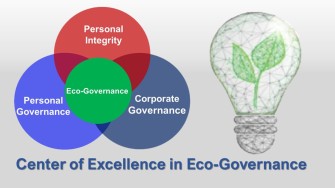
Orlando, Florida | tpsi@live.com | WhatsApp: +13053992116 | skype: h.rampersad
